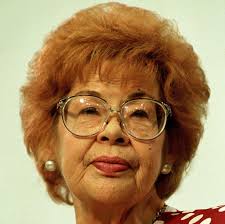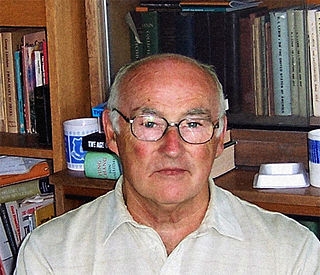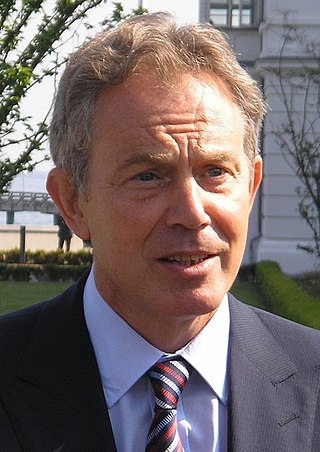Related Research Articles

Anthony Neil Wedgwood Benn, known between 1960 and 1963 as The 2nd Viscount Stansgate, was a British Labour Party politician who served as a Cabinet minister in the 1960s and 1970s. He was the Member of Parliament for Bristol South East and Chesterfield for 47 of the 51 years between 1950 and 2001. He later served as President of the Stop the War Coalition from 2001 to 2014.

New Labour is the name given to the period in the history of the British Labour Party from the mid to late 1990s until 2010 under the leadership of Tony Blair and Gordon Brown. The name dates from a conference slogan first used by the party in 1994, later seen in a draft manifesto which was published in 1996 and titled New Labour, New Life for Britain. It was presented as the brand of a newly reformed party that had altered Clause IV and endorsed market economics. The branding was extensively used while the party was in government between 1997 and 2010. New Labour was influenced by the political thinking of Anthony Crosland and the leadership of Blair and Brown as well as Peter Mandelson and Alastair Campbell's media campaigning. The political philosophy of New Labour was influenced by the party's development of Anthony Giddens' Third Way which attempted to provide a synthesis between capitalism and socialism. The party emphasised the importance of social justice, rather than equality, emphasising the need for equality of opportunity and believed in the use of markets to deliver economic efficiency and social justice.
The Socialist Campaign Group, also simply known as the Campaign Group, is a UK parliamentary caucus of the Labour Party including Members of Parliament in the House of Commons of the United Kingdom. The group also includes some MPs who formerly represented Labour in Parliament but have had the whip withdrawn or been expelled from the party.

Josephine Richardson was a British Labour Party politician. At the time of her death she was Member of Parliament for Barking, a post she had held almost exactly 20 years, since 1974.

Labour Students is a student organisation within the Labour Party of the United Kingdom. It is a network of affiliated college and university clubs, known as Labour Clubs, who campaign in their campuses and communities for Labour's values of equality and social justice.

Peter Taaffe is a British Marxist Trotskyist political activist and journalist. He was the general secretary of the Socialist Party of England and Wales from its founding until 2020 and was a member of the International Executive Committee of the Committee for a Workers' International (CWI).
The soft left, also known as the open left, inside left and historically as the Tribunite left, is a faction within the British Labour Party. The term "soft left" was coined to distinguish the mainstream left, represented by former leader Michael Foot, from the hard left, represented by Tony Benn. People belonging to the soft left may be called soft leftists or Tribunites.

Eric Samuel Heffer was a British socialist politician. He was Labour Member of Parliament for Liverpool Walton from 1964 until his death. Due to his experience as a professional joiner, he made a speciality of the construction industry and its employment practices, but was also concerned with trade union issues in general. He changed his view on the European Common Market from being an outspoken supporter to an outspoken opponent, and served a brief period in government in the mid-1970s. His later career was dominated by his contribution to debates within the Labour Party and he defended the Liverpool City Council.
Scottish Labour Students (SLS) is a student society affiliated to Scottish Labour, and part of the UK wide organisation Labour Students.
The 1988 Labour Party leadership election saw Tony Benn, identified with the left wing of the British Labour Party, challenge the incumbent leader Neil Kinnock identified with the more moderate social democratic wing.

This is a timeline of events relating to the final years of Tony Blair's tenure as Leader of the Labour Party and prime minister and the leadership elections to find replacements for him and Deputy Prime Minister John Prescott, from his announcement that he would not lead Labour into a fourth general election, concluding with Gordon Brown becoming prime minister.
The 1981 Labour Party deputy leadership election took place on 27 September 1981 when Tony Benn unsuccessfully challenged the incumbent deputy leader Denis Healey at the party conference. Healey had been elected unopposed as deputy leader in the previous year.
The Labour Party Young Socialists (LPYS) was the youth section of the Labour Party in Britain from 1965 until 1991. In the 1980s, it had around 600 branches, 2,000 delegates at its national conferences and published a monthly newspaper, Left, later Socialist Youth. From the early 1970s, it was led by members of Militant.
The International Marxist Group (IMG) was a Trotskyist group in Britain between 1968 and 1982. It was the British Section of the Fourth International. It had around 1,000 members and supporters in the late 1970s. In 1980, it had 682 members; by 1982, when it changed its name to the Socialist League, membership had fallen to 534.

The Socialist Party is a Trotskyist political party in England and Wales. Founded in 1997, it had formerly been Militant, an entryist group in the Labour Party from 1964 to 1991, which became Militant Labour from 1991 until 1997.
The Militant tendency, or Militant, was a Trotskyist group in the British Labour Party, organised around the Militant newspaper, which launched in 1964. According to Michael Crick, its politics were based on the thoughts of Karl Marx, Friedrich Engels, Vladimir Lenin, Leon Trotsky and "virtually nobody else".
The Campaign for Labour Party Democracy (CLPD) is a group of Labour Party activists campaigning for changes to the constitution of the Labour Party to ensure that Labour MPs and Labour governments enacted policies agreeable to the party membership. It was founded by activists in 1973, with support from about ten Labour MPs, and its first President was Frank Allaun. A leading co-founder was Vladimir Derer, and his house in Golders Green became CLPD's headquarters for about twenty-five years.

Jonathan Lansman is a British political activist. He is best known for having worked on Jeremy Corbyn's successful 2015 campaign for the leadership of the Labour Party and subsequently founded the pro-Corbyn organisation Momentum. He is a member of the Labour Party's National Executive Committee. Lansman has worked for both Tony Benn and Michael Meacher, and was a prominent supporter of Benn in the early 1980s.
The Rank and File Mobilising Committee (RFMC) was an umbrella group which coordinated left wing groups to campaign for increased democracy within the Labour Party.
References
- ↑ Labour Co-ordinating Committee, 1981 - 1985-09, GBR/0014/KNNK 2/1/53. Churchill Archives Centre. https://archivesearch.lib.cam.ac.uk/repositories/9/archival_objects/454075 Accessed May 13, 2024.
